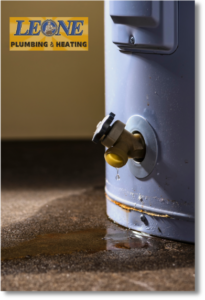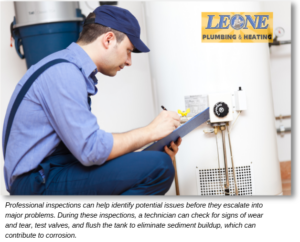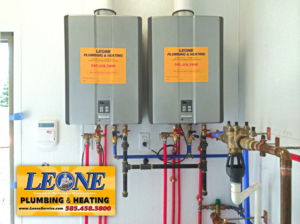How to Detect and Fix a Leaking Water Heater
 Is your water heater leaking? Don’t panic! Today, we’ll show you how to detect and fix a leaking water heater like a pro. Leaks are a common issue that can be caused by a variety of factors, such as a faulty valve, loose connections, or internal corrosion. Our troubleshooting tips will equip you with the knowledge to identify the source of the leak and guide you through the steps to fix it.
Is your water heater leaking? Don’t panic! Today, we’ll show you how to detect and fix a leaking water heater like a pro. Leaks are a common issue that can be caused by a variety of factors, such as a faulty valve, loose connections, or internal corrosion. Our troubleshooting tips will equip you with the knowledge to identify the source of the leak and guide you through the steps to fix it.
Signs of a Leaking Water Heater
Detecting a leak in a water heater can sometimes be as simple as observing your surroundings. Below are the noticeable signs of a leaking water heater. Regularly monitoring your water heater’s performance can help you catch these signs early, allowing you to take action before a minor issue escalates into a more severe problem.Water Pooling
One of the most noticeable signs of a leaking water heater is the presence of water pooling around the base of the unit. If you notice a small puddle or damp spots on the floor, it’s essential to investigate further. This accumulation of water not only indicates a potential leak but also poses a risk of water damage to your flooring and surrounding areas. Even minor leaks, if left unaddressed, can lead to significant problems over time.
Rust or Corrosion on the Tank
Another crucial sign to watch for is the presence of rust or corrosion on the tank. If you notice any reddish-brown stains or flaking metal on the exterior of the water heater, it could be a warning sign of internal corrosion. This deterioration can lead to leaks if the tank becomes compromised.Unusual Sounds from the Water Heater
If you hear unusual sounds coming from the heater, such as rumbling or hissing, this could indicate sediment buildup or overheating, which may contribute to leaks or other failures.Fluctuating Water Temperature
Fluctuating water temperatures can also be a sign of a leaking water heater. If you find that water is not consistently hot or if there are sudden changes in temperature, it may be due to a leak or a malfunctioning thermostat.Common Causes Of Water Heater Leaking
Understanding the common causes of water heater leaks can be instrumental in diagnosing the issue. One of the most frequent culprits is a faulty drain valve. This valve is located at the bottom of the tank and is used for draining water for maintenance or repairs. If the drain valve is loose or damaged, it can allow water to escape, leading to leaks. Regularly checking the condition of this valve and ensuring it’s tightly closed can help prevent unwanted leaks.
Another common cause is the temperature and pressure relief (TPR) valve. This safety device releases excess pressure from the tank to prevent explosions or damage. If the TPR valve becomes faulty or if the temperature inside the tank gets too high, it can start leaking. It’s crucial to ensure that this valve is functioning correctly and not discharging water excessively. If it is leaking, it may need to be replaced promptly to avoid further complications.
Finally, internal corrosion can be a significant factor leading to leaks in older water heaters. Over time, sediment buildup and the natural aging of the tank can cause the metal to corrode, resulting in pinhole leaks. This issue is more common in units that haven’t been flushed regularly or are exposed to hard water. Understanding these causes can help you not only identify the problem but also take proactive measures to extend the lifespan of your water heater.
What Should I Do After Detecting A Leaking Water Heater?
When you suspect a leak in your water heater, the first step is to perform a thorough visual inspection. Start by checking the area around the heater for any signs of moisture or water pooling. Look closely at the tank itself, inspecting for any visible cracks, rust, or corrosion. Pay special attention to the connections and fittings, as these are common areas for leaks to develop. Make sure to check the floor beneath the heater, as water can accumulate and be concealed under the unit.
Next, you should examine the valves and fittings connected to the water heater. This includes the inlet and outlet pipes, as well as the drain and TPR valves. Utilize a cloth to wipe around these areas and see if any water appears, indicating a leak. If you find moisture, it might be a sign that a connection needs tightening or that a valve is malfunctioning. If the leak is coming from a specific valve, it can often be resolved without replacing the entire unit.
Additionally, if you have access to a moisture meter, you can use it to detect hidden leaks. This tool can help identify damp areas around the water heater that may not be visible to the naked eye. Once you’ve pinpointed the source of the leak, you’ll be better equipped to take the necessary steps to resolve the issue effectively. Remember that safety is paramount; if you feel uncomfortable or unsure at any point, it’s best to consult a professional.
Immediate Actions To Take When You Find A Leak
Upon discovering a leak in your water heater, it’s vital to act quickly to mitigate any potential damage. The first step is to turn off the power supply to the unit. If you have an electric water heater, locate the circuit breaker and switch it off. For gas water heaters, turn the gas valve to the “off” position. This action prevents any electrical hazards or gas leaks while you address the problem. Safety should always be your top priority; never attempt repairs while the unit is still powered on.
Next, you will need to shut off the water supply to the water heater. Locate the cold water shut-off valve, typically situated on the cold water line leading to the tank. Turning this valve clockwise will stop additional water from entering the tank, helping to minimize the leak and prevent further flooding. If the leak is significant, you may also want to turn off the main water supply to your home until the issue is resolved.
After cutting off the power and water supply, it’s essential to drain the tank if the leak is severe. This can be done using a hose connected to the drain valve at the bottom of the tank. Place the other end of the hose in a bucket or drain to safely direct the water away from your home. Draining the tank will not only help prevent water damage but also make it easier to assess the leak’s source and perform any necessary repairs. Always proceed with caution, as the water may be hot and could cause burns.
DIY Fixes For Minor Water Heater Leaks
For minor leaks, many homeowners can undertake DIY fixes that are both cost-effective and straightforward. If the leak originates from a loose connection, the first step is to tighten the fitting. Use an adjustable wrench to gently secure any loose nuts or fittings without overtightening, which could cause additional damage. Sometimes, simply tightening a connection can resolve the issue entirely, and it’s a good first step to try before moving on to more extensive repairs.
If the leak is coming from the drain valve, it may be possible to replace the valve rather than the entire unit. Start by turning off the water supply and draining any excess water from the tank. Once the tank is empty, you can unscrew the old drain valve and replace it with a new one. Make sure to apply the plumber’s tape to the threads of the new valve to ensure a watertight seal. Reattach the valve, turn the water supply back on, and check for leaks to confirm that the problem has been resolved.
In cases where the temperature and pressure relief valve is leaking, it may also be a relatively simple fix. First, ensure that the water heater is turned off and that the tank has cooled. Then, you can unscrew the faulty valve and replace it with a new one, applying the plumber’s tape as needed. Make sure to test the new valve by allowing the tank to fill and checking for any signs of leakage. If these DIY fixes do not resolve the issue or if the leak is more severe, it may be time to consult a professional plumber.
Preventive Measures To Avoid Water Heater Leaks

Taking preventive measures can significantly reduce the likelihood of experiencing leaks in your water heater. One of the most effective strategies is to schedule regular maintenance checks for your unit. Professional inspections can help identify potential issues before they escalate into major problems. During these inspections, a technician can check for signs of wear and tear, test valves, and flush the tank to eliminate sediment buildup, which can contribute to corrosion.
Moreover, it’s beneficial to monitor the temperature settings of your water heater. Keeping the thermostat set to a moderate temperature, typically around 120 degrees Fahrenheit, can prevent excessive pressure from building up within the tank. High temperatures can lead to increased wear on the tank and valves, ultimately resulting in leaks. Investing in a water heater timer can also help regulate temperature and reduce energy costs.
Lastly, consider using a water softener if you live in an area with hard water. Hard water can cause mineral buildup inside the tank and plumbing, leading to corrosion and potential leaks. A water softener can help reduce this buildup, extending the life of your water heater and minimizing the chances of leaks. By implementing these preventive measures, you can help ensure that your water heater remains in good working condition for years to come.
When To Call A Professional Plumber?
While DIY repairs can be effective for minor leaks, there are instances when it’s best to call in a professional plumber. If you’ve attempted to fix the leak but it persists or worsens, it’s crucial to seek expert help. Professional plumbers have the experience and tools necessary to diagnose underlying issues that may not be obvious to a homeowner. They can assess the situation thoroughly and provide solutions that ensure the safety and reliability of your water heater.
Additionally, if you notice significant water accumulation or signs of water damage in your home, do not hesitate to call a professional. Water damage can lead to more severe problems, including mold growth and structural damage, which can be costly to repair. A plumber can help you address the leak promptly, minimizing damage and protecting your home. They can also inspect for other potential issues that could lead to further leaks down the line.
At Leone Plumbing & Heating, we prioritize quality and safety when repairing or replacing a defective water heater. Our team of professional plumbers in Rochester, NY, is equipped with the knowledge and expertise needed to handle the entire installation process, ensuring safe and efficient operation. Water heater installation requires specialized skills, and we take pride in delivering reliable solutions that you can trust. If you’re searching for a trusted plumbing service in Rochester, NY, to fix or replace your water heater, look no further than Leone Plumbing & Heating. Contact us today!
